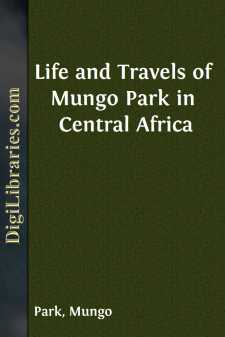Categories
- Antiques & Collectibles 13
- Architecture 36
- Art 48
- Bibles 22
- Biography & Autobiography 813
- Body, Mind & Spirit 142
- Business & Economics 28
- Children's Books 17
- Children's Fiction 14
- Computers 4
- Cooking 94
- Crafts & Hobbies 4
- Drama 346
- Education 46
- Family & Relationships 57
- Fiction 11829
- Games 19
- Gardening 17
- Health & Fitness 34
- History 1377
- House & Home 1
- Humor 147
- Juvenile Fiction 1873
- Juvenile Nonfiction 202
- Language Arts & Disciplines 88
- Law 16
- Literary Collections 686
- Literary Criticism 179
- Mathematics 13
- Medical 41
- Music 40
- Nature 179
- Non-Classifiable 1768
- Performing Arts 7
- Periodicals 1453
- Philosophy 64
- Photography 2
- Poetry 896
- Political Science 203
- Psychology 42
- Reference 154
- Religion 513
- Science 126
- Self-Help 84
- Social Science 81
- Sports & Recreation 34
- Study Aids 3
- Technology & Engineering 59
- Transportation 23
- Travel 463
- True Crime 29
Life and Travels of Mungo Park in Central Africa
by: Mungo Park
Description:
Excerpt
INTRODUCTION.
Progress of African Discovery, before Park's first Expedition.—Park's Early Life.
The first information we have respecting the interior of Africa is derived from Herodotus, who, during his residence in Egypt, endeavoured to collect as much intelligence as possible respecting the general aspect of the country. He describes it as far less fertile than the cultivated parts of Europe and Asia, and much exposed to drought, with the exception of a few verdant spots. To the northern coast, he gives the name of the forehead of Africa; and says that immediately south from it, the comparative fertility of the soil rapidly decreases. There are natural hills of salt, out of which the inhabitants scoop houses to shelter themselves from the weather; rain they have not to fear, as scarcely a drop ever alights upon that sultry region. Farther south still, there is no food to support man or beast—neither shrub, nor a single drop of water; all is silence and utter desolation. Herodotus then proceeds to relate a number of monstrous fables, which bear an overwhelming proportion to the parts of his narrative which are now known to be true. He also describes a large inland river, which some have supposed to be the Niger, flowing from west to east. He acquired this information from the reports of various travellers, who stated that after a long journey to the interior, they had themselves seen it. This account was confirmed by several other ancient authors; but for a long time the question was agitated by modern writers as to whether the Gambia or the Senegal was not the river spoken of; some even denying the existence of the Niger altogether.
The fables of Herodotus were repeated, with a number of additions, by Diodorus; but the narrative of Strabo, in regard to the northern and western coasts, is somewhat more particular and authentic: it adds nothing, however, to our acquaintance with the interior. The Greeks, under the government of the Ptolemies, navigated the Red Sea, and carried on a trade with Egypt; and some settlements were made by them in that country. Ptolemy Euergetes conquered part of Abyssinia, and established a kingdom, of which Axum was the metropolis; and remains of Grecian architecture have since been found in that quarter. To the two districts we have mentioned, the knowledge which the ancients possessed of Africa was almost exclusively confined; though Herodotus speaks of two voyages which had been undertaken with a view to determine the shape of the continent; but as nothing interesting can be gleaned from his indistinct narrative, and as the reality even of these voyages has been disputed, it seems unnecessary to give any account of them.
As in this brief sketch we are to confine ourselves entirely to discoveries made in the interior of Africa, we shall not mention either the various voyages made along the shores, or the different settlements formed upon the coast, as this would lead us far beyond our narrow limits.
The Arabians were the first who introduced the camel into Africa, an animal whose strength and swiftness peculiarly suited it for traversing the immense expanse of burning sands....



